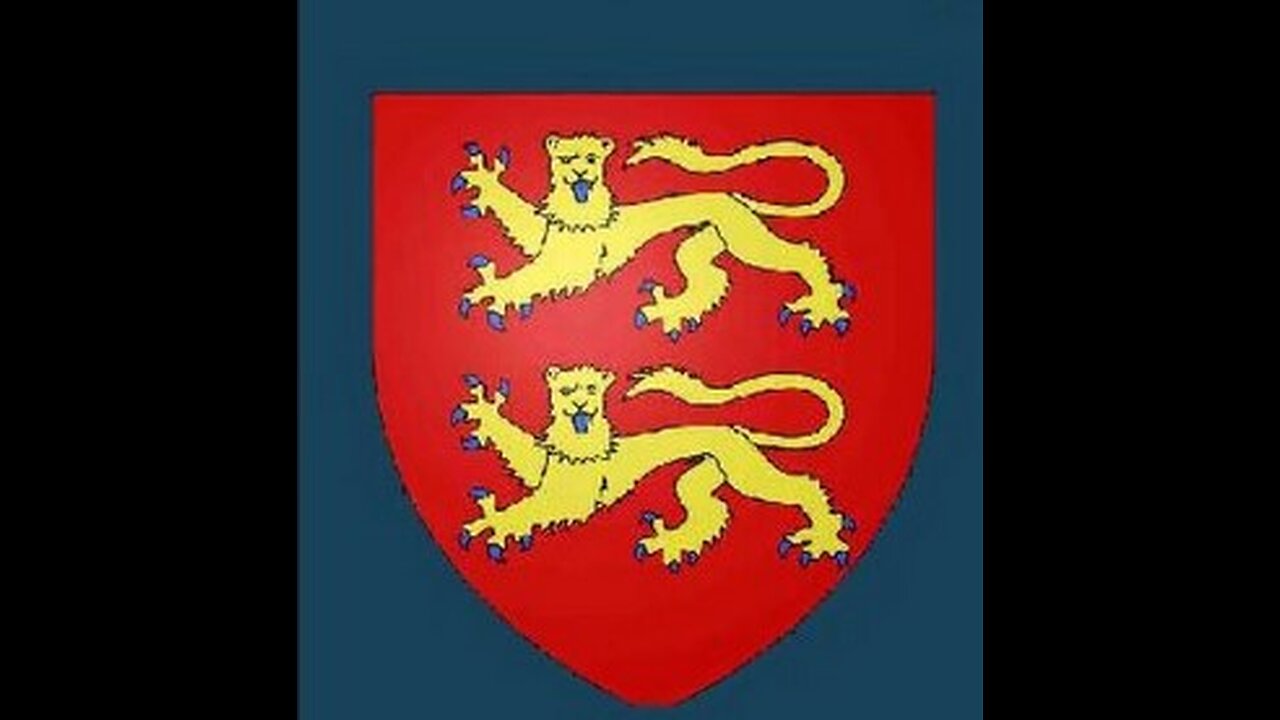Premium Only Content

William the Conqueror: Destiny Forged by Celestial Forces and Ruthless Reality.
VIDEO TEXT:
In 1028, on October 14th according to the Julian calendar, Guillaume le Conquérant, widely known as William the Conqueror, was born in Falaise, south of Caen, Calvados, Normandy, France. He died 58 years later on September 9, 1087, in the Priory of Saint Gervase, Rouen, Duchy of Normandy.
Guillaume le Conquérant ruled over two realms: the Duchy of Normandy, which he inherited on July 3rd, 1035, at the age of 7, from his father Robert I The Magnificent, who died in Nicaea, Asia Minor or Anatolia (modern Turkey), during a pilgrimage to Jerusalem. The second realm he ruled was the Kingdom of England, formerly known as the Anglo-Saxon Kingdom. Guillaume was crowned King of England on December 25, 1066, in Westminster Abbey, following his victory over Harold Godwinson at the Battle of Hastings on October 14, 1066. His coronation marked the beginning of the Norman kings era in England. The lands and riches of the Anglo-Saxon ruling class were systematically confiscated and transferred to the Norman conquerors.
Guillaume le Conquérant governed England for 21 years until his death in 1087. He designated William Rufus, his third son, to inherit the Kingdom of England, while his eldest son Robert inherited the Duchy of Normandy and Maine.
Based on my analysis of William's natal chart, his destiny was influenced by four celestial bodies. The first two are Mars and the Sun in the 7th house of Marriage, unions, and relationships. After establishing peace in his inherited land of Normandy, which experienced extremely turbulent times after his father's death, William focused on securing his borders by marrying the right woman. He wedded Mathilda, daughter of Count Baldwin V of Flanders, an important figure in international politics who ruled over much of urbanized Europe and was one of the wealthiest lords in all of Europe. With Flanders bordering Normandy to the northeast, it was the right move politically. Despite being a politically-driven marriage, William remained faithful to Mathilda for the rest of his life according to all written history. Mathilda bore him four sons: Robert, Richard, William Rufus, and Henry; the last two became Kings of England. She also bore him six daughters: Adeliza, Cecilia, Constance, Adela, Agatha, and Mathilda.
Many notable figures throughout history can trace their lineage back to the Norman dynasty, including American presidents like George Washington and many others up to the present day. Mars's influence in the same house 7, along with the Sun, provided William with all the will and conviction needed to concentrate on one woman, the right woman under the perfect politically-driven marriage. His Sun was Mathilda, and Mars' drive for conquest drove him to her. This celestial-driven marriage was built to last.
The third celestial body that built William’s destiny was Neptune, in retrograde motion, in the 11th house of friendships and community, Neptune retrograde in the 11 house brings temporary friendships that supports the individual at crucial times but later these friendships are set to turn into adversaries. His approach to friendships, social networks, and collective endeavours was marked by elusiveness. To illustrate, William's friends were akin to the crocodiles in the Live and Let Die movie scene where James Bond 007 had to hop over the crocodiles’ heads to cross the pond. For 007 it was a pond, for William, it was the crossing of the English Channel.
Neptune retrograde in the 11th house ensured William an open portal to insights through dreaming. His army wanted him to invade Anglo-Saxon England sooner, yet he did not agree until he felt the time was right, and history proved him correct. If Harold Godwinson had not been countering the Norwegian invasion in the north just two weeks prior to William's landing in Pevensey, history would’ve been different and against William, favouring the Anglo-Saxons. Neptune, the shady, cagey celestial body, made William a great politician, securing friendships and allies doomed to fail while guiding him with the gift of prophetic dreaming.
His alliance with Harold Godwinson, the second most powerful man who later became the last Anglo-Saxon King of England after King Edward the Confessor, exemplifies how William’s acquaintances often became his foes, it is known that Harold willingly rode into battle with William and helped to defeat Conan II of Brittany. His fleeting friends included the Norman nobility and mercenaries from France, Flanders, Germany, and Brittany who financially supported his successful claim to the English throne. This coalition enabled William to gather an impressive fleet of 700 ships to invade Anglo-Saxon England, then the wealthiest nation in Western Europe at the turn of the 11th century. William's army was equipped with hobelars, soldiers with long kite-shaped shields, lances, and superbly bred and trained horses unafraid of battle noises. The army also included archers and mounted warriors, as depicted in the Bayeux Tapestry.
I would venture to say that William proceeded to invade Anglo-Saxon England only after his visionary prophetic dreams told him to do so. That is the innate gift Neptune retrograde gives to the individual when Neptune is placed in the 11th house.
The fourth and last celestial body that significantly influenced William’s life was Uranus, positioned in the 3rd house of logic, communication, and knowledge. This placement guaranteed William’s originality and brilliance, assisting him in gaining the full support of Alexander II, the Pope of the Roman Catholic Church at that time. William of Normandy presented a compelling case against Harold to the Pope, which was successful in gaining papal backing for his invasion. The Pope sent him the papal banner, allowing William to carry it into battle at the head of his army, implicitly deterring potential invaders from his core lands in Normandy out of fear of the Pope.
The 3rd house is associated with knowledge, learning, and thinking. Based on this placement, William must have had a very high IQ, he needed to learn quickly, adapt fast, and advance without error, which he accomplished. Uranus made him an innate rapid thinker, akin to the greatest chess players of all time. Uranus in the 3rd house of logic and knowledge is highly favourable, providing strong critical thinking abilities and the capacity to communicate challengingly while being recognized as a genius.
William was easily irritated by stupidity and was a pragmatic man of no nonsense. To engage in a meaningful conversation with him, dialogue needed to be firmly based on facts. His rebellious nature, if left unchecked, could turn into madness, a trait evident in the ruthless way he governed England. This dark side of his personality was given by Uranus and heightened and shaped by events such as witnessing murders up close from the age of 7 and surviving several assassinations attempts by aristocrats and nobles of the era.
Guillaume le Conquérant also known as William the conqueror chose the right partner for marriage and remained faithful, all predetermined by the Sun and Mars. William had the gift of prophetic dreaming given by Neptune, which assisted him in getting the support he needed at crucial times. Finally, Uranus gave him brilliant rapid thinking abilities, fundamental for his conquering vocation, along with the ruthlessness of a dictator who never excused himself for the atrocities committed until his last five days, when, according to written history, he kept apologizing in a nonsensical manner. This proves that his ruthless personality was also a product of the harsh and violent reality he had to endure since early in life. Thank you.
-
 4:31
4:31
CoachTY
22 hours ago $21.53 earnedCOINBASE AND DESCI !!!!
130K10 -
 10:02
10:02
MichaelBisping
21 hours agoBISPING: "Was FURY ROBBED?!" | Oleksandr Usyk vs Tyson Fury 2 INSTANT REACTION
57K13 -
 8:08
8:08
Guns & Gadgets 2nd Amendment News
2 days ago16 States Join Forces To Sue Firearm Manufacturers Out of Business - 1st Target = GLOCK
97.5K86 -
 10:17
10:17
Dermatologist Dr. Dustin Portela
2 days ago $17.70 earnedOlay Cleansing Melts: Dermatologist's Honest Review
132K14 -
 1:02:20
1:02:20
Trumpet Daily
2 days ago $42.82 earnedObama’s Fake World Comes Crashing Down - Trumpet Daily | Dec. 20, 2024
89.9K59 -
 6:29
6:29
BIG NEM
1 day agoCultivating God Mode: Ancient Taoist NoFap Practices
70.1K17 -
 30:53
30:53
Uncommon Sense In Current Times
2 days ago $11.03 earned"Pardon or Peril? How Biden’s Clemency Actions Could Backfire"
80.7K5 -
 40:01
40:01
CarlCrusher
1 day agoSkinwalker Encounters in the Haunted Canyons of Magic Mesa - ep 4
74.7K9 -
 59:44
59:44
PMG
2 days ago $10.28 earned"BETRAYAL - Johnson's New Spending Bill EXPANDS COVID Plandemic Powers"
76.3K49 -
 6:48:50
6:48:50
Akademiks
1 day agoKendrick Lamar and SZA disses Drake and BIG AK? HOLD UP! Diddy, Durk, JayZ update. Travis Hunter RUN
195K35